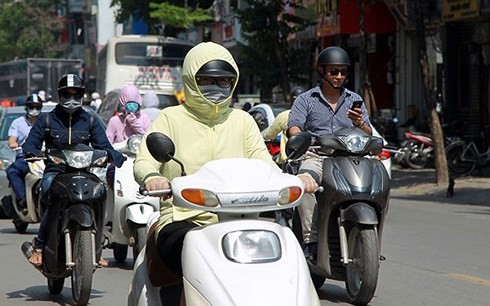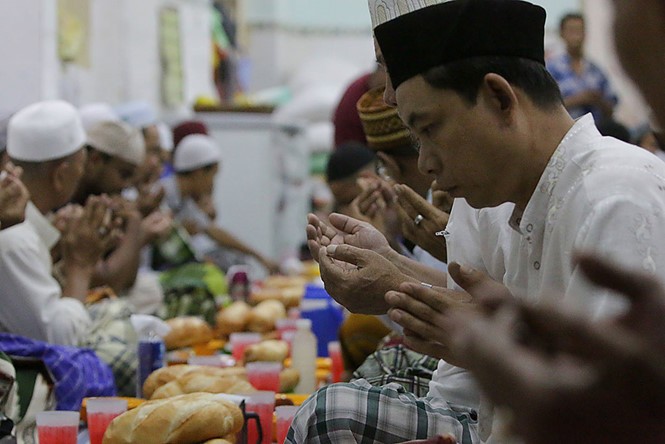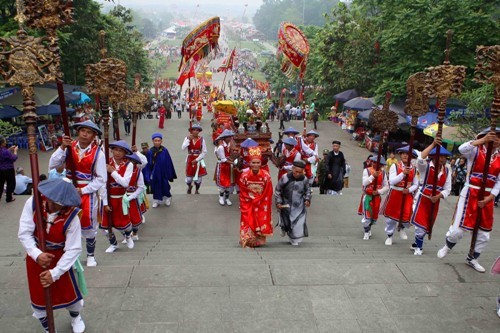A: First on our show today, let’s check out the weather in Vietnam as many listeners want to know what it is like.
B: Hanoi and the northern and north-central region in general are now in the middle of summer, so the weather is really hot, dry, and stuffy. The temperatures range from 25 to 37 or 38 Degrees Celsius. There are occasional showers late in the afternoon and evening, but they don’t last long enough to cool down the temperature.
A: In south-central and southern Vietnam, the rainy season has started. The weather is still hot with few occasional showers. The temperature is Ho Chi Minh City is 1-2 degrees Celsius lower in Hanoi.
 Hot spells is forecast to hit northern and central Vietnam until August Hot spells is forecast to hit northern and central Vietnam until August |
B: Hot spells will continue to hit northern and central Vietnam until August but they will not last for long and be strong, according to the National Hydro-Meteorological Centre (NHMC). In the northern region, most of torrential rainfalls will occur from June to August while the temperature in November and December is forecast to be 0.5 – 1.0 Celsius degree higher than the average of previous years.
A: From July to September, large waves, which can be 2 – 4 metres high, are forecast to occur in waters off central and southern provinces due to impacts of the southwest monsoon while coastal northern provinces must also watch out for large waves from the northeast monsoon. This year will see about 13 storms and tropical depressions in the East Sea, with five storms forecast to directly affect Vietnam’s mainland.
B: Typhoons and tropical depressions are more likely to hit the northern part of the East Sea at the beginning of this rainy season and will move towards the south in late 2018. However, their impact on southern Vietnam is expected to be not less severe than in the past 2 years.
A: This week, we received a number of reports from Didarul Iqbal, Chairman of the South Asia Radio Club in Bangladesh. He listened to our broadcasts daily from June 4th to 10th on the frequency of 7220 khz and 7280 khz with SINPO of between 4 and 5.
B: Thank you very much for your frequent reception reports. We’ll send you QSL cards to confirm your reports.
 Muslims pray before the Eid al-Fitr, Muslims pray before the Eid al-Fitr, |
A: Writing to VOV this week, Muhammad Aqeel Bashir of Pakistan tell us about Eid celebration in the Muslim world. He wrote: “Ramadan is the ninth month in the Islamic calendar, which is determined by the lunar cycle. The start of the event is based on the sighting of the new moon, which marks the beginning of the month. If the new moon (Hilal) is spotted, fasting begins the following day. Similarly when determining the last day of Ramadan, if the new moon is sighted the holy month is complete and Eid is celebrated the following day.”
B: Ramadan is the most important month in the lives of Muslims. The holy month of fasting is about to end with Eid al-Fitr, a day of joyous prayer, feasting, and celebration. Eid is not a fixed date, but is dependent on the sighting of a new moon - marking the start of the Islamic month Shawaal. It is celebrated by the gathering of family and friends and many also attend special Eid prayers in the morning. The most common greeting to say to Muslims is Eid Mubarak.”
A: Eid 2018 is celebrated from the evening of June 14, 2018 and to the evening of June 17 all over the world. The celebrations include gorging on some delicious food and wishing each other the mandatory ‘Eid Mubarak’ with the traditional hug.
B: Thank you, Mr. Muhammad Aqeel Bashir, for sharing your story about Eid event of the Muslims with us. We hope to continue to receive frequent feedback from you and other members of your radio listeners’ club.
A: Listening to our broadcast on at 1618 UTC on June 15 on the frequency of 7280, Debakamal Hazarika of India wrote: “I listened to your “Culture program”, in which you talked about Phu Tho province’s preservation of local heritages. I learned a lot about the province. The music you played in this program was really nice. I enjoyed the show very much.”
B: Thank you, Mr. Debakamal Hazarika, for your feedback. Phu Tho province is Vietnam’s place of origin, where many cultural heritages associated with the Hung Kings, the legendary founders of the Vietnamese nation, are preserved.
 Phu Tho province has 2 UNESCO-recognized intangible cultural heritages of humanity Phu Tho province has 2 UNESCO-recognized intangible cultural heritages of humanity |
A: Phu Tho is the only locality in Vietnam with 2 UNESCO-recognized intangible cultural heritages of humanity. They are the Hung Kings worship and Xoan singing. The death anniversary of the Hung Kings and the Hung King Temple Festival, attract many domestic and foreign visitors.
B: The province has 345 relics related to the Hung Kings, 30 relics related to Xoan singing, and 5 national intangible cultural heritages. Phu Tho is also famous for a number of unique cultural festivals. The Dao Xa elephant procession festival in Thanh Thuy district is one of the biggest.
A: The festival takes place from the 27th to the 29th day of the first lunar month. Worshiping feasts and fruits trays are carefully prepared. On a bronze tray, fruits are arranged in a 1-meter high 9-layer pyramid decorated with flowers. The feasts include sticky rice, boiled chicken, sweet bean cakes, and honey cakes.
B: The solemn ritual ceremony expresses people’s gratitude to the village genie, Hung Hai Cong, who, according to legend, was a younger brother of the 18th Hung King.
A: The worshiping ceremony is followed by the elephant procession involving more than 120 people led by a pair of big elephants to the accompaniment of by music. “Mr. Elephant”, made to look like a real elephant, is handled by 2 young men. While the two “Mr. Elephants” play with the crowd, others wave flags and run around to excite the crowd. The procession goes from the communal house to the temple and back.
B: The ceremony is followed by come several folk games and a rice cooking competition. The festival reflects historical and cultural values of Vietnam’s wet rice civilization and the northern belief in water genies. It is an opportunity for the locals to show their gratitude to their ancestors.
A: Last but not least in today’s show, we’d like to acknowledge letters and emails from Shyamal Kumar Banerjee, Dilipkumar Sarkar, Balar Murali, Ratan Kumar Paul, and Deekay Dimple of India, Abid Hussain Sajid of Pakistan, Liu Wei of China, Claudio Galaz of the US, and David Woods of Japan. We’ll confirm your reports with QSL cards soon.
A: We welcome your feedback at: English Section, VOVWorld, the Voice of Vietnam, 45 Ba Trieu Street, Hanoi, Vietnam. Or you can email us at: englishsection@vov.org.vn. You’re invited to visit us online at vovworld.vn, where you can hear both live and recorded programs. Check out our VOV Media App available on both IOS and Android platforms to hear our live broadcasts. We look forward to your feedback on the mobile version of vovworld.vn. Once again, thank you all for listening. Good bye until next time.